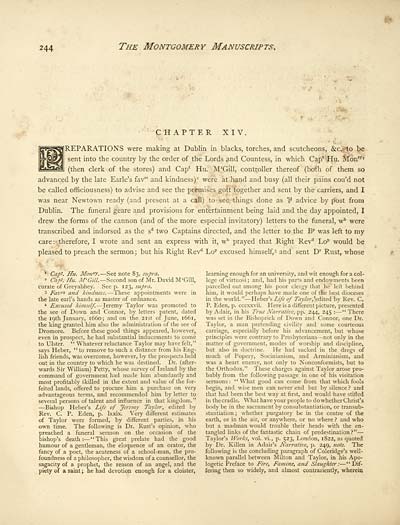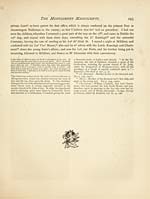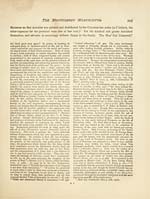Montgomery manuscripts
(258) Page 244
Download files
Complete book:
Individual page:
Thumbnail gallery: Grid view | List view

■
244
The Montgomery Manuscripts.
chapter XIV.
REPARATIONS were making at Dublin in blacks, torches, and scutcheons, &c. to be
sent into the country by the order of the Lords and Countess, in which Cap' Hu. Mon*"
(then clerk of the stores) and Cap' Hu. M'Gill, controller thereof (both of them so
advanced by the late Earle's fav" and kindness) 2 were at hand and busy (all their pains cou'd not
be called officiousness) to advise and see the premises gott together and sent by the carriers, and I
was near Newtown ready (and present at a call) to see things done as 1? advice by post from
Dublin. The funeral geare and provisions for entertainment being laid and the day appointed, I
drew the forms of the cannon (and of the more especial invitatory) letters to the funeral, w h were
transcribed and indorsed as the s a two Captains directed, and the letter to the B p was left to my
care: therefore, I wrote and sent an express with it, w h prayed that Right Rev d Lo p would be
pleased to preach the sermon ; but his Right Rev d Lo p excused himself^ and sent D r Rust, whose
1 Capt. Hu. Maury.— See note 83, supra.
■ Capt. Hu. M'Gill— Second son of Mr. David M 'Gill,
curate of Greyabbey. Seep. 123, supra.
3 Favrs and kindness. — These appointments were in
the late earl's hands as master of ordnance.
* Excused himself. — Jeremy Taylor was promoted to
the see of Down and Connor, by letters patent, dated
the 1 9th January, 1660; and on the 2 1st of June, 1661,
the king granted him also the administration of the see of
Dromore. Before these good things appeared, however,
even in prospect, he had substantial inducements to come
to Ulster. " Whatever reluctance Taylor may have felt,"
says Heber, ' ' to remove to such a distance from his Eng-
lish friends, was overcome, however, by the prospects held
out in the country to which he was destined. Dr. (after-
wards Sir William) Petty, whose survey of Ireland by the
command of government had made him abundantly and
most profitably skilled in the extent and value of the for-
feited lands, offered to procure him a purchase on very
advantageous terms, and recommended him by letter to
several persons of talent and influence in that kingdom."
— Bishop Heber's Life of Jeremy Taylor, edited by
Rev. C. P. Eden, p. lxxix. Very different estimates
of Taylor were formed, by different parties, in his
own time. The following is Dr. Rust's opinion, who
preached a funeral sermon on the occasion of the
bishop's death: — "This great prelate had the good
humour of a gentleman, the eloquence of an orator, the
fancy of a poet, the acuteness of a school-man, the pro-
foundness of a philosopher, the wisdom of a counsellor, the
sagacity of a prophet, the reason of an angel, and the
piety of a saint ; he had devotion enough for a cloister,
learning enough for an university, and wit enough for a col-
lege of virtuosi ; and, had his parts and endowments been
parcelled out among his poor clergy that he left behind
him, it would perhaps have made one of the best dioceses
in the world. " — Heber's Life of Taylor,'edited by Rev. C.
P. Eden, p. cccxxvii. Here is a different picture, presented
by Adair, in his True Narra live, pp. 244, 245 : — "There
was set in the Bishoprick of Down and Connor, one Dr.
Taylor, a man pretending civility and some courteous
carriage, especially before his advancement, but whose
principles were contrary to Presbyterians — not only in the
matter of government, modes of worship and discipline,
but also in doctrine. He had sucked in the dregs of
much of Popery, Socinianism, and Arminianism, and
was a heart enemy, not only to Nonconformists, but to
the Orthodox." These charges against Taylor arose pro-
bably from the following passage in one of his visitation
sermons: "What good can come from that which fools
begin, and wise men can never end but by silence ? and
that had been the best way at first, and would have stifled
in the cradle. What have your people to do whether Christ's
body be in the sacrament by consubstantiation, or transub-
stantiation ; whether purgatory be in the centre of the
earth, or in the air, or anywhere, or no where ? and who
but a madman would trouble their heads with the en-
tangled links of the fantastic chain of predestination?" —
Taylor's Works, vol. vi. , p. 523, London, 1822, as quoted
by Dr. Killen in Adair's Narrative, p. 249, note. The
following is the concluding paragraph of Coleridge's well-
known parallel between Milton and Taylor, in his Apo-
logetic Preface to Fire, Famine, and Slaughter: — " Dif-
fering then so widely, and almost contrariently, wherein
244
The Montgomery Manuscripts.
chapter XIV.
REPARATIONS were making at Dublin in blacks, torches, and scutcheons, &c. to be
sent into the country by the order of the Lords and Countess, in which Cap' Hu. Mon*"
(then clerk of the stores) and Cap' Hu. M'Gill, controller thereof (both of them so
advanced by the late Earle's fav" and kindness) 2 were at hand and busy (all their pains cou'd not
be called officiousness) to advise and see the premises gott together and sent by the carriers, and I
was near Newtown ready (and present at a call) to see things done as 1? advice by post from
Dublin. The funeral geare and provisions for entertainment being laid and the day appointed, I
drew the forms of the cannon (and of the more especial invitatory) letters to the funeral, w h were
transcribed and indorsed as the s a two Captains directed, and the letter to the B p was left to my
care: therefore, I wrote and sent an express with it, w h prayed that Right Rev d Lo p would be
pleased to preach the sermon ; but his Right Rev d Lo p excused himself^ and sent D r Rust, whose
1 Capt. Hu. Maury.— See note 83, supra.
■ Capt. Hu. M'Gill— Second son of Mr. David M 'Gill,
curate of Greyabbey. Seep. 123, supra.
3 Favrs and kindness. — These appointments were in
the late earl's hands as master of ordnance.
* Excused himself. — Jeremy Taylor was promoted to
the see of Down and Connor, by letters patent, dated
the 1 9th January, 1660; and on the 2 1st of June, 1661,
the king granted him also the administration of the see of
Dromore. Before these good things appeared, however,
even in prospect, he had substantial inducements to come
to Ulster. " Whatever reluctance Taylor may have felt,"
says Heber, ' ' to remove to such a distance from his Eng-
lish friends, was overcome, however, by the prospects held
out in the country to which he was destined. Dr. (after-
wards Sir William) Petty, whose survey of Ireland by the
command of government had made him abundantly and
most profitably skilled in the extent and value of the for-
feited lands, offered to procure him a purchase on very
advantageous terms, and recommended him by letter to
several persons of talent and influence in that kingdom."
— Bishop Heber's Life of Jeremy Taylor, edited by
Rev. C. P. Eden, p. lxxix. Very different estimates
of Taylor were formed, by different parties, in his
own time. The following is Dr. Rust's opinion, who
preached a funeral sermon on the occasion of the
bishop's death: — "This great prelate had the good
humour of a gentleman, the eloquence of an orator, the
fancy of a poet, the acuteness of a school-man, the pro-
foundness of a philosopher, the wisdom of a counsellor, the
sagacity of a prophet, the reason of an angel, and the
piety of a saint ; he had devotion enough for a cloister,
learning enough for an university, and wit enough for a col-
lege of virtuosi ; and, had his parts and endowments been
parcelled out among his poor clergy that he left behind
him, it would perhaps have made one of the best dioceses
in the world. " — Heber's Life of Taylor,'edited by Rev. C.
P. Eden, p. cccxxvii. Here is a different picture, presented
by Adair, in his True Narra live, pp. 244, 245 : — "There
was set in the Bishoprick of Down and Connor, one Dr.
Taylor, a man pretending civility and some courteous
carriage, especially before his advancement, but whose
principles were contrary to Presbyterians — not only in the
matter of government, modes of worship and discipline,
but also in doctrine. He had sucked in the dregs of
much of Popery, Socinianism, and Arminianism, and
was a heart enemy, not only to Nonconformists, but to
the Orthodox." These charges against Taylor arose pro-
bably from the following passage in one of his visitation
sermons: "What good can come from that which fools
begin, and wise men can never end but by silence ? and
that had been the best way at first, and would have stifled
in the cradle. What have your people to do whether Christ's
body be in the sacrament by consubstantiation, or transub-
stantiation ; whether purgatory be in the centre of the
earth, or in the air, or anywhere, or no where ? and who
but a madman would trouble their heads with the en-
tangled links of the fantastic chain of predestination?" —
Taylor's Works, vol. vi. , p. 523, London, 1822, as quoted
by Dr. Killen in Adair's Narrative, p. 249, note. The
following is the concluding paragraph of Coleridge's well-
known parallel between Milton and Taylor, in his Apo-
logetic Preface to Fire, Famine, and Slaughter: — " Dif-
fering then so widely, and almost contrariently, wherein
Set display mode to:
![]() Universal Viewer |
Universal Viewer | ![]() Mirador |
Large image | Transcription
Mirador |
Large image | Transcription
Images and transcriptions on this page, including medium image downloads, may be used under the Creative Commons Attribution 4.0 International Licence unless otherwise stated. ![]()
| Histories of Scottish families > Montgomery manuscripts > (258) Page 244 |
|---|
| Permanent URL | https://digital.nls.uk/95236023 |
|---|
| Description | A selection of almost 400 printed items relating to the history of Scottish families, mostly dating from the 19th and early 20th centuries. Includes memoirs, genealogies and clan histories, with a few produced by emigrant families. The earliest family history goes back to AD 916. |
|---|

